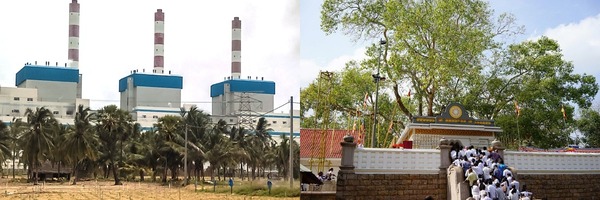Colombo: Recent reports have emerged indicating that toxic acids, which evaporated from the Norochcholai Coal Power Plant, may threaten the Sri Maha Bodhi tree, the oldest living tree of the world with a written history, Colombo Gazette reported.
The development comes as China is returning to Sri Lanka as Beijing first gave its consent on conditionalities for the International Monetary Fund to lend money to the island nation. Reports indicate that China’s Sinopec has committed to invest in Sri Lanka’s Hambantota.
In the past, China’s predatory practices in Sri Lanka have been well documented, and the possible threat of environmental damage to the sacred Sri Mahabodhi Tree located in Anuradhapura is disturbing, according to the Colombo Gazette report. The Sri Mahabodhi Tree is grown from a branch of the sacred Bodhi tree in India’s Gaya.
The Sri Lankan President’s Media Division (PMD) said China’s Sinopec has committed to investing in Sri Lanka’s Hambantota at a meeting with the Sri Lankan President Ranil Wickremesinghe. The decision comes as China seeks to consolidate its investments in the island nation’s ports and energy sector.
The previous government had leased the USD 1.5 billion Hambantota port constructed by China to state-owned firms on a 99-year lease. China had promised to set up a 15,000-acre industrial zone around the port which is yet to materialize, as per the news report. Beijing’s lending to the island nation and the investments worth billions of dollars has raised concerns regarding a possible plan to set up a military base in Hambantota.
The Sri Lankan President’s Media Division (PMD) said a meeting occurred between the Sinopec Group representatives and Wickremesinghe on March 13. The PMD, in a statement, said, “President Ranil Wickremesinghe said that the government has taken a principled decision to expand the distribution of fuel & Hambantota has been identified as a primary energy hub”, reported Colombo Gazette. Sinopec has also committed to investing in a refinery in Hambantota.
Wickremesinghe’s meeting with the Sinopec comes ten days after Sri Lankan President ordered the country’s Petroleum Minister to swiftly revive the Trincomalee oil tank farm and incorporate it into the country’s economy. Emissions from the Lakvijaya(Norchcholai) power plant have already negatively affected the environment and resident society.
Ecologists have assessed that clouds carrying dangerous acid deposits could move in the direction of Anuradhapura, where the sacred Sri Mahabodhi tree is located in Sri Lanka. Evidence regarding this has come from the trees near the plant which have already started showing symptoms of the damage, as per the news report.
The leaves of taller trees have started turning yellowish due to the emission of gases from the power plant. It is expected that the effect of toxic emissions will also be felt on the Sri Mahabodhi tree. Furthermore, the acidic condition is also spreading towards the sea areas, as per the Colombo Gazette report.
Rebuilding such harmful coal power plants in future will pose a threat to the ecosystem. The Norochcholai Power Plant in Sri Lanka’s Northwestern province is about an hour away from the Sri Mahabodhi tree at Anuradhapura. The tree holds significant importance for Buddhists who visit and pay homage to the sacred tree.
Norchcholai is Sri Lanka’s largest thermal power plant and emissions from the 900MW coal power plant are said to be much above permissible standards, possibly due to frequent breakdowns, intermittent operations and unexpected storage of fly ash in open pits. Sri Lanka’s first coal-fired thermal power plant and largest power station was implemented as a joint venture of the Ceylon Electricity Board with the aid of the EXIM Bank of China.
The power plant also gives rise to a large amount of solid waste, heat waste and water pollution due to the release of heated water and will have long-term environmental impacts.
The main issues regarding the plant are related to fly ash and bottom ash produced during the power generation process. Fly ash and bottom ash are by-products of the coal combustion process. Fly ash open dumping is also of significant concern as the yard is open to wind erosion and leaching.
Reportedly, several children in the areas surrounding the Norochcholai power plant have contracted skin diseases. China’s recent attempts to make inroads into Sri Lanka again are to be noted, remembering the past experience of the negative effect of such penetration with regard to investments and conditional aid, as per the Colombo Gazette report.
The environmental impact of the Chinese-built power plant and its potential effect on the Mahabodhi tree should be a warning to Chinese-built projects, which fully disregard environmental norms and cause more headaches than solutions. (ANI)




















Comments